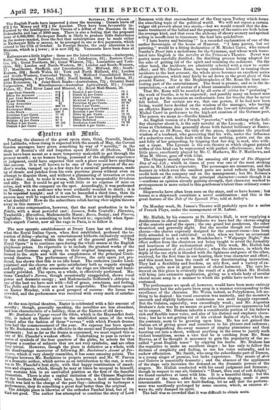At the non-lyrical theatres, Easter is celebrated with a fair
amount of novelty ; though,. generally speaking, the novelties are less abundant, and less characteristic of a holiday, than at the Easters of old days.
Mr. Buekstone's Voyage round the Globe, which is the Haymarket festi- vity, is indeed an Easter piece in the established sense of the word, formed after the fashion of those "revues " with which French drama- tists hail the commencement of the year. No expense has been spared by Mr. Buckstone to render it effective in the scenic and Terpsichorean de- partments ; but as far as the drama is concerned, we must regard this as one of Mr. Planche's weakest efforts. Undertaking to pass in review a series of symbols of the four quarters of the globe, he selects for that Purpose a number of subjects that are not very symbolic, and are often very trivial. However, though the piece is defective as a whole, with the disadvantage moreover of following Mr. Buekstone's Ascent of Par- nassus, which it very closely resembles, it has some amusing points. The dialogue between Mr. Buckatone in propria persona and Mr. W. Farren as a dramatic author, which serves as an introduction to the rest, is writ- ten in Mr. Planche's best style, with that happy combination of smart- ness and elegance, which, though he may at times be unequal to himself, ever sustains him in an unrivalled position as the first of the fanciful dramatists. There is also a capital imitation of the Chinese Magicians by the brothers Marshall; have, however, a fault similar to that which was laid to the charge of the poet Gay—intending to burlesque a Performance, they do something a great deal better than the originaL The Adelphi piece is likewise of the orthodox Paschal kind, but of its kind not good. The author has attempted to combine the story of Lord
Bateman with that encroachment of the Czar upon Turkey which forms the absorbing topic of the political world. We will not repeat a certain vulgar old proverb about two stools,—but we would remark that the dra- matic treatment of the ballad and the pungency of the satire are both below the average kind, and that even the alchemy of showy scenery and spirited acting is insufficient to trausmute the lead into quicksilver. " I bate boetry and bainting ! " is a recorded exclamation of one of the earlier Sovereigns of the house of Hanover. " I hate poetry, but not painting," would be a fitting declaration of M. Michel Cerro, who turned Goethe's Faust into a melodrama for the Gymnase, and whose work trans- lated into English is the novelty at the Princess's Theatre. Never was poetry more carefully distilled ; the distilling process being adopted for the sake of getting rid of the spirit and retaining the sediment. On the other hand, the incidents are admirably selected with a view to scenic effect; and Mr. Charles Kean, having outdone himself in turning these incidents to the best account, the whole piece becomes an excellent series of stage-pictures, which may fairly be set down as the great glory of this present Easter. Nor is the Mephistopheles of Mr. Kean the least inte- resting part of the entertainment. The fiend is prosaic, and so is the in- terpretation,—a sort of avatar of a blunt unamiable common sense. That Mr. Kean will be assailed by all sorts of critics for " profaning " the work of Goethe, is to be expected; and possibly many an honest man will get up for the occasion an enthusiastic love for Goethe that he never felt before. But certain are we, that one person, if he had now been living, would have decided on the wisdom of the manager, who having an effective Easter piece in view, selected the low-art fabrication of M. Michel Carre in preference to the high-art creation of the German poet, The person we mean is—Goethe himself.
An English version of a French "proverbe," with nothing of the holi- day character about it, is the only novelty at the Lyceum ; which, lus- trous at Christmas, has generally shone with fainter brilliancy at Easter. Give a Dog an Ill Name, the title of the piece, designates the practical wisdom of a husband, who perceiving that his wife, under the influence of a seductive roue, finds fault with him for nothing, points out the sin and folly of her proceeding, by feigning that her dog is mad, also with- out a cause. The Lyceum is the sole theatre at which elegant pointed trifles of this kind can be represented with perfect effectiveness ; and the little piece, excellently played by Mr. C. Mathews, Mr. F. Matthews, and Miss M. Oliver, goes of with éclat. The Olympic merely revives the amusing old piece of The Happiest Day of my _Life ; which in times of yore was one of the most striking pieces in Mr. Liston's repertoire. The personages are numerous, and the manner in which even the smallest parts are acted reflects the highest credit both on the company and on the management ; but Mr. Robson 's performance of Mr. Gillman, the principal character—comic though it is —confirms an opinion already gaining strength, that character marked to grotesqueness is more suited to this gentleman's talent than ordinary comic routine.
Shipwrecks have often been seen on the stage, and so have horses ; but horses in a shipwreck constitute a novel combination : and this is the great feature of the Tale of the Spanish War, told at Astley's.


























 Previous page
Previous page